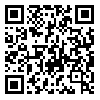Volume 31, Issue 58 (2023)
J Tax Res 2023, 31(58): 26-46 |
Back to browse issues page
Download citation:
BibTeX | RIS | EndNote | Medlars | ProCite | Reference Manager | RefWorks
Send citation to:



BibTeX | RIS | EndNote | Medlars | ProCite | Reference Manager | RefWorks
Send citation to:
Taghavi Qasemabad F, Darabi R, Charmahali S. Presenting the Tax Audit Model according to the Effects of Psychological Safety and Tax Audit Knowledge during the Detection of Tax Frauds. J Tax Res 2023; 31 (58) :26-46
URL: http://taxjournal.ir/article-1-2298-en.html
URL: http://taxjournal.ir/article-1-2298-en.html
1- , royadarabi110@yahoo.com
Abstract: (1392 Views)
Tax revenues are one of the most important sources of funding for governments, and one of the reasons why the realized tax revenue is lower than the expected amount is tax fraud. In order to reduce tax frauds, tax audits should be done in the tax organization, so in this research, a tax audit model has been presented with regard to the effects of psychological safety and knowledge of tax audits during the detection of tax frauds. The method used in this research is qualitative, foundational data and inductive analysis. The statistical population of this research includes experts in the tax audit profession, which includes 25 experts. The questionnaire information was completed in 1401. And according to the analysis, it was observed that smart and digital provincial tax, psychological safety of tax auditors, knowledge of tax audit, detection of tax frauds, sharing information related to fraud, audit knowledge of the tax director general and psychological security created by the director general. The results show that the biggest impact on tax audit is related to the psychological safety of tax auditors and then the discovery of tax frauds.
Type of Study: Research |
Subject:
Management
Received: 2023/10/24 | Accepted: 2023/09/1 | Published: 2023/09/1
Received: 2023/10/24 | Accepted: 2023/09/1 | Published: 2023/09/1
References
1. Abdullatif, M. (2016). Fraud Risk factors and audit programme modifications:evidence from Jordan, AABFJ | Volume 7, no. 1, 2016. [DOI:10.14453/aabfj.v7i1.5]
2. Argils-Bosch, J. M., Somoza, A., Ravenda, D., & García-Blandón, J. (2021). An Empirical Examination of the Influence of E-commerce on Tax Avoidance in Europe. Journal of International Accounting, Auditing and Taxation, 41, 100339. [DOI:10.1016/j.intaccaudtax.2020.100339]
3. Azizpour Lindi, Ali, (2017). Investigating the relationship between fraud in financial reporting and company characteristics and assessment of tax calculation: Evidence from the bank account audit of companies in Mazandaran province, National Conference on Management, Accounting and Business Development, Sari,
4. Barzegari Khanqa, Jamal and Faizpour, Mohammad Ali, (2013). Tax Audit based on Reports: Experiences from Developed and Developing Analysis, Quarterly Journal of Accounting and Social Interests, Volume: 3, Number: 1.
5. Dastgir Mohsen, Izadinia Nasser, Askari Ali, Ramezani Mahdi, (2015). Provide a Financial Audit Model to choose based on Tax Research Paper, 23.
6. Jodi L. Gissel , Karla M. Johnstone (2022). Information Sharing during Auditors Fraud Brainstorming: Effects of Psychological Safety and Auditor Knowledge, Auditing: A Journal of Practice & Theory, Vol. 36, No. 2. [DOI:10.2308/ajpt-51519]
7. Kazemi, Mustafa, Pour, Samira. (2012). Presenting a Structural Model of Psychological Safety Causes and Consequences. Management Studies (Improvement and Transformation), 22(71), 105-129.
8. Khosravi Pournegar, Mohsen Hamidian, Mohammad Reza Abdi, (2018). Presentation of Bank Tax Audit Model for Small and Medium Enterprises (SMEs) in Iran, Tax Research Journal. 2018; 27 (44): 46-9.
9. Khwaja, Munawer Sultan, Rajul Awasthi, and Jan Loeprick.(2011). Risk-Based Tax Audits: Approaches and Country Experiences, The International Bank for Reconstruction and Development / The World Bank, 1818 H Street NW, Washington DC 20433. [DOI:10.1596/978-0-8213-8754-2]
10. Lambsdorff, J. G. (2003). How Corruption Affects Persistent Capital Flows. Economics of Governance, 4(3), 229-243. [DOI:10.1007/s10101-002-0060-0]
11. Malekian, Esfandiar, Farzad, Sarveh. (2016). Tax Audit on the Relationship between Diagnostic, and Definitive tax: a Case Study of East, West and East and South Tehran Provinces. Financial Accounting and Audit Research 9(33), 51-64.
12. Matthias KasperJames Alm, (2022). Audits, effectiveness, and Post-audit Tax Compliance, Journal of Economic Behavior & Organization18 January 2022Volume 195 (Cover date: March 2022), Pages 87-102.
13. Nathan C. GoldmanM. Kathleen HarrisThomas C. Omer, (2022). Does task-specific knowledge improve audit quality: Evidence from Audits of Income Tax, Accounting, Organizations and Society, (Cover date: May 2022)Article 101320. [DOI:10.1016/j.aos.2021.101320]
14. Shahbazi Kyomreth, Borumand Younes, Rezaei Ebrahim, (2016). Tax control without auditing using game theory. Tax research Paper. 24 (31): 77-59.
15. Shirazi, Alipour, Samira, (2013). Investigating the Role of Psychological Safety in Promoting and Strengthening Knowledge Sharing (Case Study: Mashhad Ferdowsi University Growth Center), the Second International Conference on Management, Entrepreneurship and Economic Development, Qom.
16. Taheri, Mohammad, Khan Mohammadi, Mohammad Hamid, Jahangir Nia, Hossein, Gholami Jamkarani, Reza. (2021). Compilation of the Winning Model for Improving the Quality of Tax Audit in Iran's Value- added Tax System. Knowledge of Financial Accounting, 8(1), 29-64.
17. Vlad, M., Tulvinschi, M., & Chiriţă, I. (2011). The Consequences of Fraudulent Financial Reporting. The USV Annuals of Economics and Public Administration, 11(1), 264-268.
18. Zamanzadeh, Hamid, (2018). Reviving Economic Stability under the Shadow of Pressure, Bi-monthly Economic News, November, number 157.
Send email to the article author
| Rights and permissions | |
 |
This work is licensed under a Creative Commons Attribution-NonCommercial 4.0 International License. |






